How Does WhatsApp Conversation-Based Pricing Work?
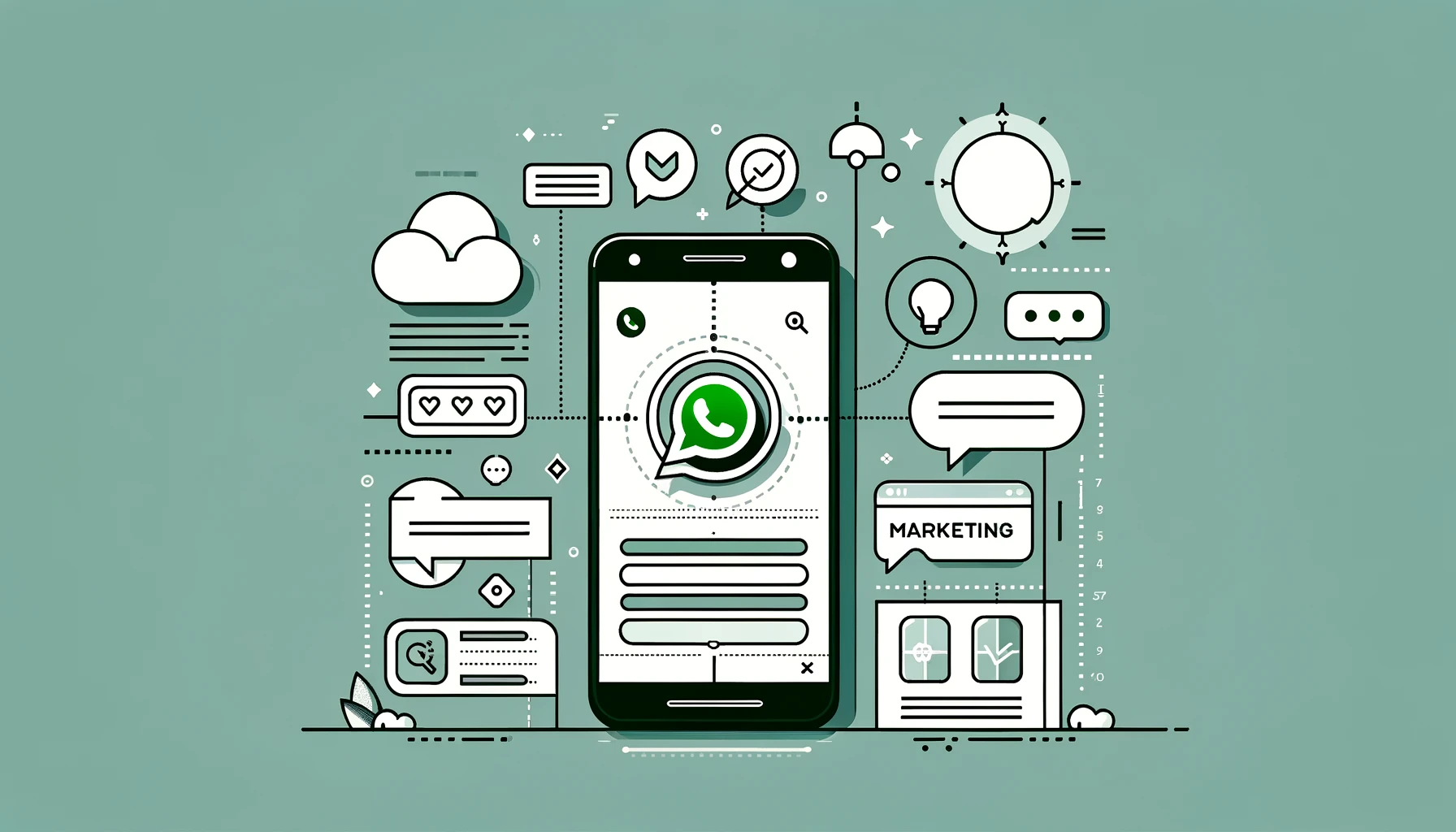
If you’re reading this article, you probably understand the value and power of the Official WhatsApp API but not necessarily its pricing.
Knowing that the way Facebook documents Conversation-Based pricing isn’t easy to grasp for an average user, as I constantly hear from clients and salesmen, this article is going to be straight to the point with some good examples.
TL;DR - WhatsApp’s pricing short explanation
Instead of charging per message like SMS, WhatsApp charges by conversation, usually a 24-hour period during which messages are exchanged between a business and a user. Conversations are priced based on countries and categories (Marketing, Utility, Authentication, Service, Free Entry Point).
The table below briefly explains WhatsApp’s conversation categories and ranks them from most expensive to least expensive:
| Category | Description | Initiator | Message | Cost |
|---|---|---|---|---|
| Marketing | Promotions & announcements | Business | Template | High |
| Utility | Order updates, payment reminders, and feedback surveys | Business | Template | Mid |
| Authentication | Account verification, recovery | Business | Template | Mid |
| Service | Resolve customer inquiries | Any | Free Form | Low |
| Free Entry Point | Initiated by users via Click to WhatsApp Ad or Facebook Page CTA, free for 72 hours | User | Any | Free |
| Service (Free Tier) | Monthly free service conversations (up to 1,000 per month) | Any | Any | Free |
This can show you how WhatsApp conversation-based pricing works; however, it can get more complicated when multiple conversation windows are opened simultaneously. It’ll all be explained below.
Still confused and don't want to read the whole article?
Book a personalized call with an expert from Xenio to learn all about WhatsApp API solutions and conversation based pricing.
Book a callWhat is a WhatsApp conversation window or duration?
The fancy explanation: A conversation window or conversation duration is the time allotted to one conversation during which a business can exchange messages that usually fall under the same category with one user.
Sounds complicated? Let me simplify it: As a business, you can send a WhatsApp message to a user, and a 24-hour countdown starts. During this time you can send additional messages for no additional costs.
This means that as long as you respond within 24 hours, you get charged for one conversation, but if you text them outside the 24 hours, you get charged for two conversations, and so on…
Unfortunately, it gets more complicated than that. Conversations are divided into different categories, and in most cases, if the messages you send fall under different categories, multiple conversation windows are opened simultaneously. Crazy, right?
A Quick Example on how this works
The best way to explain this is through an example, so let’s suppose you run a traveling agency:
- You send a message promoting a discount on a flight to Hawaii. Congrats, you just started a “Marketing Conversation”, and a 24-hour timer started
- Two hours later, you send another promotional message, reminding the user not to miss out on a once-in-a-lifetime trip. It’s within the 24-hour window, and it’s a marketing message, so WhatsApp thinks you're continuing the conversation, and no costs are added.
- Four hours later, the user who received your message books a trip, and you send them a thank-you message with a confirmation number. Well, you can celebrate that sale, but another “Utility conversation” window now opened, so you have a Utility and a Marketing conversation running simultaneously. And you’re charged for each separately.
WhatsApp categorizes your conversations based on template messages you create and submit for review through the WhatsApp manager or your BSP’s interface.
WhatsApp Conversation Categories
IMPORTANT: According to Facebook’s documentation, your business or organization is responsible for reviewing the category assigned to its approved templates. Whenever a template is used, your business/organization has to accept the charges associated with the category applied to it at the time of use.
Here are all the WhatsApp Conversation categories you need to know about:
Marketing Conversations
The name is kind of self-explanatory. These are conversations initiated by the business with messages promoting new products, services, and offers. They can also be retargeting messages, cart abandonment messages, and new feature announcements.
These are initiated by a template message sent by the business and are usually the most expensive conversations.
Utility Conversations
This type of conversation allows you to follow up on user actions or requests. These come in handy when you want to send registration or booking confirmation, order updates, delivery updates, feedback surveys, and account updates or alerts.
This type of conversation is usually initiated by the business, and it can be triggered by an action taken outside of WhatsApp like a web purchase.
The cost of Utility conversations is the second highest after Marketing conversations.
Authentication Conversations
As the name indicates, this category of conversations allows your business to authenticate users by sending one-time passcodes (OTPs) for account verification, account recovery, and integrity challenges.
This type of conversation is also initiated by businesses and It’s not as expensive as Marketing conversations.
Service
This is the conversation category that everyone needs, and it enables you to answer your clients' questions.
Unlike the other categories, this one is initiated by the user. The cool part is that this type of conversation is the cheapest and every month you get 1000 service conversations for free labeled “Free tier conversations”.
Make sure to keep on reading to understand what kind of messages is for free and what are these called
Which WhatsApp conversations are free?
There are two types of WhatsApp messages that are free: “Free Tier Conversations” and “Free Entry Point Conversations”. One applies to service conversations and the other applies to all sorts of conversations. Here’s the full explanation
Free Tier Conversations
These are actually service conversations. Each month you get 1000 free tier conversations, so if a customer reaches out asking for help, you don’t get charged. The number refreshes every month so unused Free Tier Conversations don’t carry over to the next month.
Once you exceed the 1000 conversation limit during a month, you’ll get charged based on the rate of Service Conversations.
Free Entry Point Conversations
This applies to all conversation categories, as long as the user with whom you are exchanging messages:
- Is using an Android or iOS device
- Messages you via a Click to WhatsApp Ad or Facebook Page Call-to-Action button
- You respond within 24 hours.
The cool thing about it is that if you manage to meet all the requirements above, the conversation duration lasts for 72 hours through which you can send any type of message.
This was created by Facebook to probably encourage businesses to spend money on Click to WhatsApp ads.
If you’re unfamiliar with Click to WhatsApp ads they are simply Facebook and Instagram ads that have a WhatsApp button instead of a website or a form call to action.
While the conversations are free, you must be aware that the Click to WhatsApp ads aren’t. The catch is that if you pay for this type of Facebook ad, you don’t have to pay for the conversations on top, which is only fair for digital marketers from a neutral point of view.
Examples of WhatsApp Conversation Based Pricing
1. Opening a service conversation and then a marketing conversation
A service conversation is opened if a business responds to a customer message at 9:30. Then, if it sends a marketing template while this service conversation is still open at 4:30, this opens a separate marketing conversation.
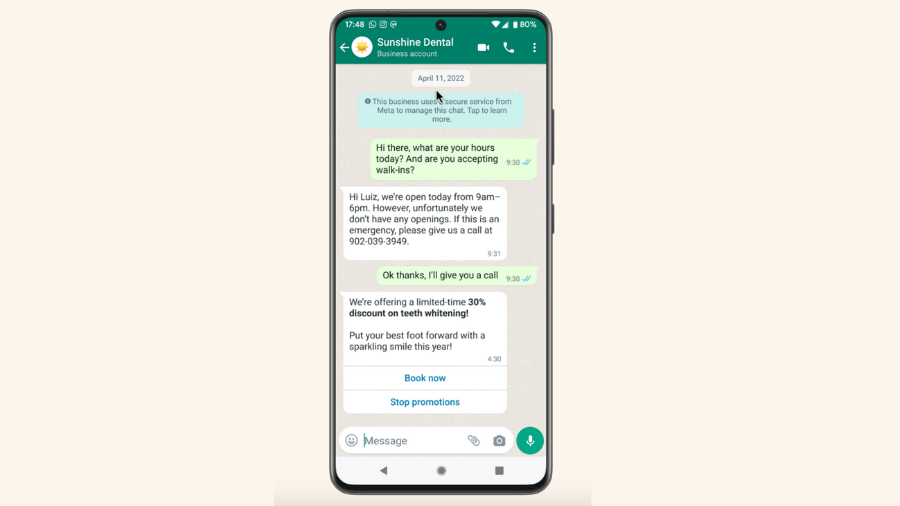
The result is one charge for a service conversation and another for a marketing conversation.
2. Opening a marketing conversation and then a utility conversation
If a business sends a promotional message at 3:40, a marketing conversation is opened. Later, with the marketing conversation still open, if the business sends a utility template let’s say at 6:00, this opens a separate utility conversation.
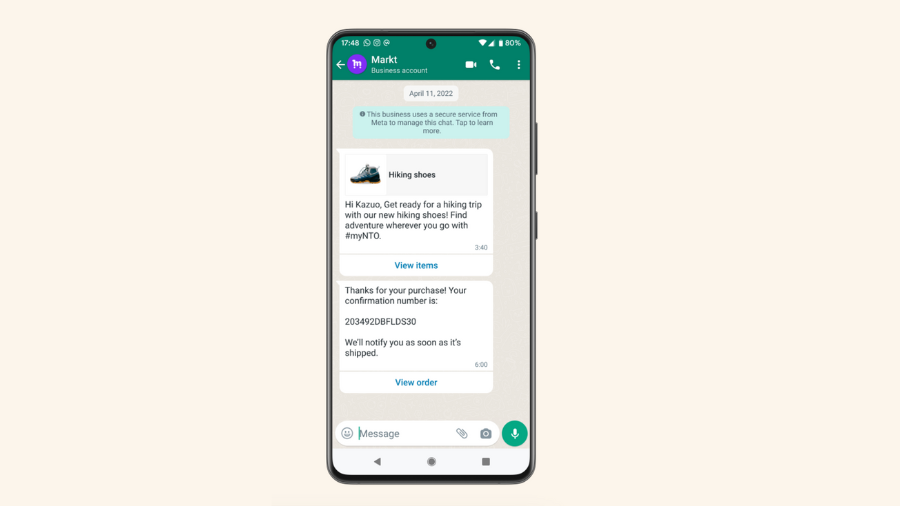
The result is one charge for a marketing conversation and another for a utility conversation.
3. Starting two conversations of the same category
Let’s say the business opens a utility conversation at 9:00. Later, with the conversation still open, the business sends another utility template message at 11:00.
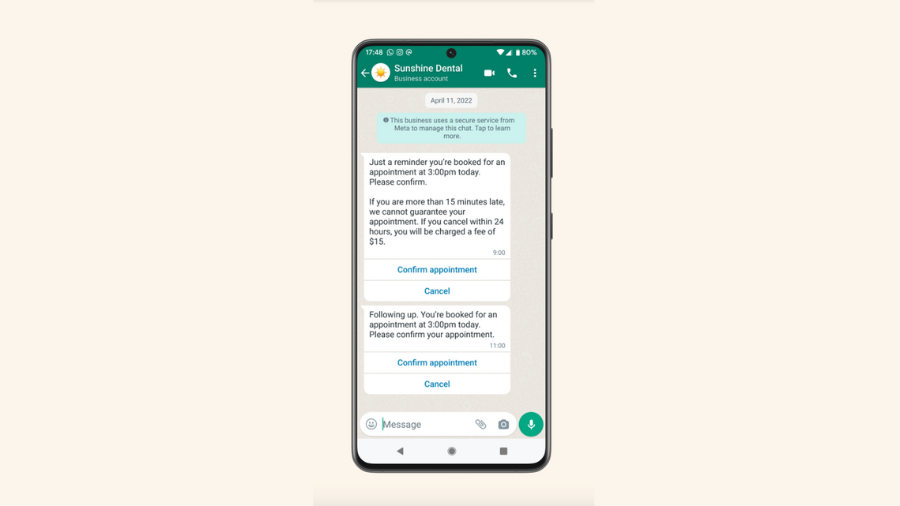
The result is one utility conversation charge.
4. One template with both utility and marketing content
You cannot cheat WhatsApp by sending a utility message like an order confirmation with a promotion to pay less for promotional messages.
If a template that includes content that is both utility and marketing is sent at 11:59 the template will be categorized as marketing.
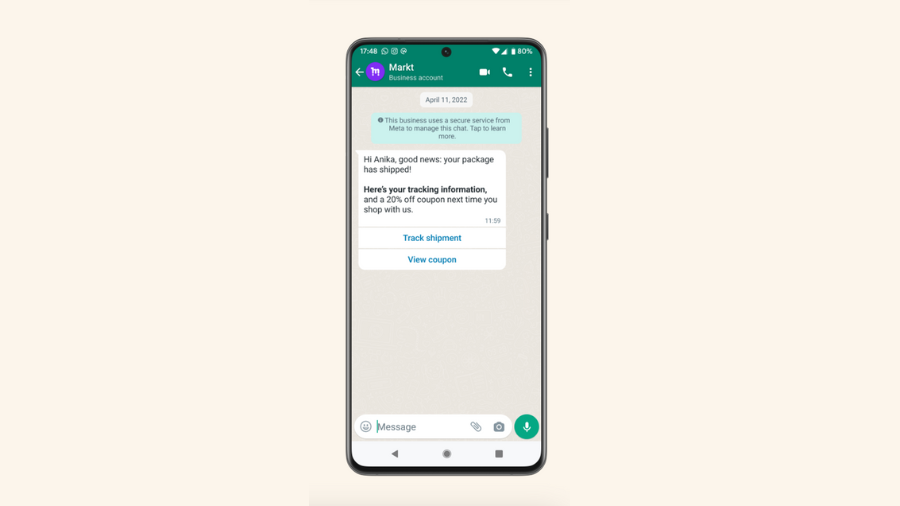
The result is one marketing conversation charge
What are the actual prices per WhatsApp conversation category?
There’s no simple or short answer for this question because it depends on your location, your business solution provider, and whether they charge additional costs per conversation.
Facebook's documentation here has downloadable rate cards, and you can check the rates per category based on your location.
Things to keep in mind
Unlike SMS, where you're charged for each message, WhatsApp charges based on conversations, which last 24 hours. These conversations are split into categories like Marketing, Utility, Authentication, Service, and Free Entry Point, each with different costs.
For example, sending promotional messages (Marketing) costs the most, while answering customer questions (Service) is the cheapest and can even be free up to a specific monthly limit.
If you start a conversation with a promotional message and then send a confirmation message for an order within the same 24 hours, you could be charged for two separate conversations.
Also, you cannot cheat WhatsApp by adding promotions to authentication and utility messages because these will be charged as promotional messages.
By knowing how these categories work, you can reduce costs and avoid surprises. So, whether you're running a small online store or a larger enterprise, understanding WhatsApp’s pricing can help you stay on budget and communicate effectively with your customers.